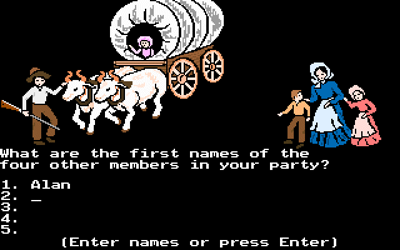A Serious Game’s Story

My name is Oregon Trail…
…and I’m an eLearning game. I was first developed in 1971, and since then I’ve been played on Apple computers, Windows computers, iOS devices, Nintendo, and even Blackberrys. You’ve probably heard of me — they’ve sold 65 million copies.
Like most other eLearning games, I teach people by making learning fun and interactive for the learner. Unfortunately, like most other eLearning games, most of the learning activities I create don’t get recorded. I create valuable learning experiences, but they’re often not measured.
Older eLearning standards just don’t work for recording the experiences I create. I don’t always get played in a browser. I’m not always being played on a “connected” device. I’m definitely not played in an LMS, and I’m sometimes played as a mobile app. These things just don’t work with older standards like SCORM and AICC.
Why would you want to record all of the learning experiences I create? And why would I want to use a widely adopted eLearning standard for recording them? Well, just like any other learning data, tracking it is useful to spot trends and make judgments about what activities are actually working to help people learn things. And if this data could be tracked in a way that it could live side by side with other learning data (test results, for example) then the big picture of teaching and learning is easy to see.
The Experience API makes me more useful as a game. It makes it possible for me to record all of the learning data that I generate, and that data lives side by side with all of the other data that’s being generated by students and teachers.
Oregon Trail's xAPI Statements, as played by Alan:
| Alan’s Experience | Experience API Statement |
| Alan chose to be a carpenter. | Alan completed “choose occupation” with a result of “carpenter.” |
| Alan added Jamie to his party. | Alan completed “add member to your party” with result of Jamie. |
| Alan added Heidi to his party. | Alan completed “add member to your party” with result of Heidi. |
| Alan added Don to his party. | Alan completed “add member to your party” with result of Don. |
| Alan added Scott to his party. | Alan completed “add member to your party” with result of Scott. |
| Alan bought 30 pounds of food from the store. | Alan completed “purchase food from the store” with result of 30 pounds. |
| Alan started his journey, on the way to the Kansas River crossing. | Alan attempted “Kansas River crossing” section. |
| Scott got dysentery, and Alan chose to continue his journey rather than take action. | Alan experienced “party member getting dysentery.” Alan experienced “ignore dysentery and continue on journey.” |
| Alan made it to the Kansas River. | Alan completed “arrival at Kansas River crossing”. |
| Alan chose to cross the river by floating it. | Alan completed “floating the Kansas River.” |
| Alan ran out of food. | Alan experienced “running out of food.” |
| Alan decided to hunt for food. | Alan attempted “hunting.” |
| Alan killed 140 pounds of wild animals. | Alan completed hunting with a result of 140 pounds. |
| Alan made it to Chimney Rock in 24 days. | Alan completed “Chimney Rock destination” with a result of 24 days. |
Games are an immersive and effective way for people to learn, but they’ve previously not been well tracked. xAPI not only allows you to track whatever you want in a game, but it allows the learning data to live in the same system as all of your other learning data. This lets instructors see the big picture of learning and teaching, and helps them to better figure out effective ways to teach.